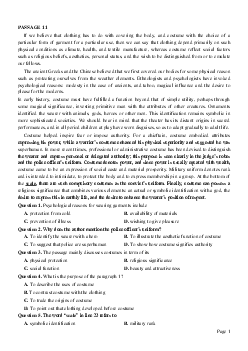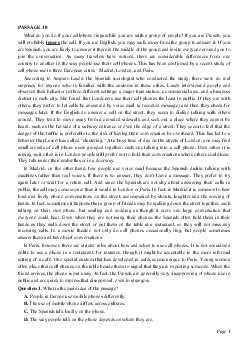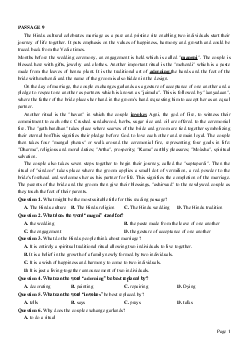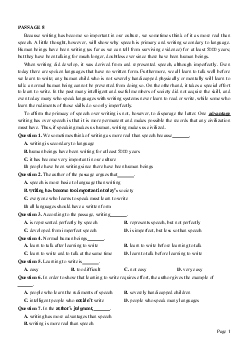



Preview text:
PASSAGE 25
Learning means acquiring knowledge or developing the ability to perform new behaviors. It is
common to think of learning as something that takes place in school, but much of human learning occurs
outside in classroom and people continue to learn throughout their lives.
Even before they enter school, young children learn to walk, to talk and to use their hands to
manipulate toys, food and other objects. They use all of their senses to learn about the sights, sounds,
tastes and smells in their environments. They learn how to interact with their parents, siblings, friends and
other people important to their world. When they enter school, children learn basic academic subjects
such as reading, writing and mathematics. They also continue to learn a great deal outside the classroom.
They learn which behaviors are likely to be rewarded and which are likely to be punished. They learn
social skills for interacting with other children. After they finish school, people must learn- to adapt to the
many major changes that affect their lives, such as getting married, raising children and finding and keeping a job.
Because learning continues throughout our lives and affects almost everything we do, the study of
learning is important in many different fields. Teachers need to understand the best ways to educate
children. Psychologists, social workers, criminologists and other human-service workers need to
Understand how certain experiences change people's behaviors. Employers, politicians and advertisers
make use of the principles of learning to influence the behavior of workers, voters and consumers
Learning is closely related to memory, which is the storage of information in the brain. Psychologists
who study memory are interested in how the brain stores knowledge, where this storage takes place now
the brain later retrieves knowledge when we need it. In contrast, psychologists who study le are more
interested in behavior and how behavior changes as a result of a person's experiences.
There are many forms of learning, ranging from simple to complex. Simple forms of learning involve a
single stimulus. A stimulus is anything perceptible to the senses, such as a sight, sound, smell or taste. In
a form of learning known as classical conditioning, people learn to associate two stimuli that occur in
sequence, such as lightning followed by thunder. In operant conditioning, people learn by forming an
association between a behavior and its consequences (reward or punishment). People and animals can
also learn by observation - that is, by watching others perform behaviors. More complex forms of
learning include learning languages, concepts and motor skills.
Question 1. According to the passage, which of the following is learning in broad view comprised of?
A. Knowledge acquisition and ability development.
B. Acquisition of social and behavioral skills.
C. Acquisition of academic knowledge.
D. Knowledge acquisition outside the classroom.
Question 2. According to the passage, what are children NOT usually taught outside the classroom?
A. Interpersonal communication. B. Life skills.
C. Literacy and calculation. D. Right from wrong.
Question 3. Getting married, raising children and finding and keeping a job are mentioned in paragraph 2 as examples of
A. the changes to which people have to orient themselves
B. the situations in which people cannot teach themselves Page 1
C. the ways people's lives are influenced by education
D. the areas of learning which affect people's lives
Question 4. According to the passage, the study of learning is important in many fields due to
A. the need for certain experiences in various areas
B. the exploration of the best teaching methods
C. the great influence of the on-going learning process
D. the influence of various behaviors in the learning process
Question 5. It can be inferred from the passage that social workers, employers and politicians concern
themselves with the study of learning because they need to .
A. change the behaviors of the object of their interest towards learning
B. thoroughly understand the behavior of the objects of their interest
C. make the objects of their interest more aware of the importance of learning
D. understand how a stimulus relates to the senses of the objects of their interest
Question 6. The word "retrieves" in paragraph 4 is closest in meaning to A. generates B. creates C. recovers D. gains
Question 7. Which of the following statements is NOT true according to the passage?
A. Psychologists studying memory are concerned with how the stored knowledge is used.
B. Psychologists studying memory are concerned with the brain's storage of knowledge.
C. Psychologists are all interested in memory as much as behaviors.
D. Psychologists studying learning are interested in human behaviors.
Question 8. According to the passage, the stimulus in simple forms of learning
A. bears relation to perception
B. is created by the senses
C. is associated with natural phenomena
D. makes associations between behaviours. ĐÁP ÁN 1-A 2-C 3-A 4-C 5-B 6-C 7-C 8-A
LỜI GIẢI CHI TIẾT Question 1: A
Theo đoạn văn, điều nào sau đây là học theo quan điểm rộng bao gồm?
A. Tiếp thu kiến thức và phát triển khả năng.
B. Tiếp thu các kỹ năng xã hội và hành vi.
C. Tiếp thu kiến thức hàn lâm.
D. Thu nhận kiến thức bên ngoài lớp học.
=> Dẫn chứng: Learning means acquiring knowledge or developing the ability to perform new behaviors.
=> Dịch: Học có nghĩa là có được kiến thức hoặc phát triển khả năng thực hiện các hành vi mới. Question 2: C Page 2
Theo đoạn văn, những gì trẻ em thường KHÔNG được dạy bên ngoài lớp học?
A. Giao tiếp giữa các cá nhân. B. Kỹ năng sống.
C. Biết chữ và tính toán. D. Đúng và sai.
=> Dẫn chứng: When they enter school, children learn basic academic subjects such as reading, writing
and mathematics. They also continue to learn a great deal outside the classroom. They learn which
behaviors are likely to be rewarded and which are likely to be punished. They learn social skills for
interacting with other children. After they finish school, people must learn- to adapt to the many major
changes that affect their lives, such as getting married, raising children and finding and keeping a job.
Dịch: Khi vào trường, trẻ học các môn học cơ bản như đọc, viết và toán. Họ cũng tiếp tục học được rất
nhiều thứ bên ngoài lớp học. Họ tìm hiểu những hành vi có khả năng được khen thưởng và có khả năng bị
trừng phạt. Họ học các kỹ năng xã hội để tương tác với những đứa trẻ khác. Sau khi học xong, mọi người
phải học cách thích nghi với nhiều thay đổi lớn ảnh hưởng đến cuộc sống của họ, chẳng hạn như kết hôn,
nuôi con và tìm và giữ một công việc. Question 3: A
Kết hôn, nuôi con và tìm và giữ một công việc được đề cập trong đoạn 2 như các ví dụ về
A. những thay đổi mà mọi người phải tự định hướng
B. những tình huống mà mọi người không thể tự dạy mình
C. cách sống của mọi người bị ảnh hưởng bởi giáo dục
D. các lĩnh vực học tập ảnh hưởng đến cuộc sống của mọi người
Dẫn chứng: After they finish school, people must learn- to adapt to the many major changes that affect
their lives, such as getting married, raising children and finding and keeping a job.
Dịch: Sau khi học xong, mọi người phải học cách thích nghi với nhiều thay đổi lớn ảnh hưởng đến cuộc
sống của họ, chẳng hạn như kết hôn, nuôi con và tìm và giữ một công việc. Question 4: C
Theo đoạn văn, nghiên cứu học tập rất quan trọng trong nhiều lĩnh vực do
A. sự cần thiết cho một số kinh nghiệm trong các lĩnh vực khác nhau
B. sự khám phá các phương pháp giảng dạy tốt nhất
C. ảnh hưởng lớn của quá trình học tập đang diễn ra
D. ảnh hưởng của các hành vi khác nhau trong quá trình học tập
=> Dẫn chứng: Because learning continues throughout our lives and affects almost everything we do, the
study of learning is important in many different fields.
Dịch: Bởi vì việc học tiếp tục trong suốt cuộc đời của chúng ta và ảnh hưởng đến hầu hết mọi thứ chúng
ta làm, nên việc học tập rất quan trọng trong nhiều lĩnh vực khác nhau. Question 5: B
Có thể suy ra từ đoạn văn mà nhân viên xã hội, người sử dụng lao động và chính trị gia quan tâm đến việc
nghiên cứu học tập bởi vì họ cần phải .
A. thay đổi hành vi của đối tượng họ quan tâm đến việc học
B. hiểu thấu đáo hành vi của các đối tượng họ quan tâm
C. làm cho các đối tượng quan tâm của họ nhận thức rõ hơn về tầm quan trọng của việc học
D. hiểu làm thế nào một kích thích liên quan đến các giác quan của các đối tượng quan tâm của họ Page 3
Dẫn chứng: Employers, politicians and advertisers make use of the principles of learning to influence the
behavior of workers, voters and consumers.
Dịch: người sử dụng lao động, chính trị gia và nhà quảng cáo sử dụng các nguyên tắc học tập để tác động
đến hành vi của công nhân, cử tri và người tiêu dùng. Question 6: C
Từ "hồi phục" trong đoạn 4 có nghĩa gần nhất với A. tạo B. tạo C. phục hồi D. tăng
Dẫn chứng: Psychologists who study memory are interested in how the brain stores knowledge, where
this storage takes place now the brain later retrieves knowledge when we need it.
Dịch: Các nhà tâm lý học nghiên cứu về trí nhớ quan tâm đến cách não lưu trữ kiến thức, nơi lưu trữ này
diễn ra bây giờ não sau đó phục hồi kiến thức khi chúng ta cần. Question 7: C
Phát biểu nào sau đây KHÔNG đúng theo đoạn văn?
A. Các nhà tâm lý học nghiên cứu về trí nhớ quan tâm đến việc sử dụng kiến thức được lưu trữ.
B. Các nhà tâm lý học nghiên cứu về trí nhớ có liên quan đến việc lưu trữ kiến thức của não.
C. Các nhà tâm lý học đều quan tâm đến trí nhớ nhiều như các hành vi.
D. Các nhà tâm lý học nghiên cứu học tập quan tâm đến hành vi của con người.
Dẫn chứng: Learning is closely related to memory, which is the storage of information in the brain.
Psychologists who study memory are interested in how the brain stores knowledge, where this storage
takes place now the brain later retrieves knowledge when we need it. In contrast, psychologists who study
le are more interested in behavior and how behavior changes as a result of a person's experiences.
Dịch: Việc học có liên quan mật thiết đến trí nhớ, đó là việc lưu trữ thông tin trong não. Các nhà tâm lý
học nghiên cứu về trí nhớ quan tâm đến cách não lưu trữ kiến thức, nơi lưu trữ này diễn ra ngay lúc này
tại não sau đó đưa ra kiến thức khi chúng ta cần. Ngược lại, các nhà tâm lý học nghiên cứu quan tâm đến
trí nhớ nhiều hơn đến hành vi và cách thay đổi hành vi do trải nghiệm của một người. Question 8: A
Theo đoạn văn, sự kích thích trong các hình thức học tập đơn giản là
A. liên quan đến nhận thức
B. được tạo ra bởi các giác quan
C. gắn liền với hiện tượng tự nhiên
D. tạo mối liên hệ giữa các hành vi.
Dẫn chứng: Simple forms of learning involve a single stimulus.[…] In operant conditioning, people learn
by forming an association between a behavior and its consequences (reward or punishment). People and
animals can also learn by observation - that is, by watching others perform behaviors.
Dịch: Các hình thức học tập đơn giản liên quan đến một kích thích duy nhất. […] Trong điều kiện làm
việc, mọi người học bằng cách hình thành mối liên hệ giữa một hành vi và hậu quả của nó (phần thưởng
hoặc hình phạt). Con người và động vật cũng có thể học bằng cách quan sát - nghĩa là bằng cách xem
người khác thực hiện các hành vi. => liên quan đến nhận thức. Page 4




